
Michael Laurence Nyman, CBE is an English composer, pianist, librettist, musicologist, and filmmaker. He is known for numerous film scores, and his multi-platinum soundtrack album to Jane Campion's The Piano. He has written a number of operas, including The Man Who Mistook His Wife for a Hat; Letters, Riddles and Writs; Noises, Sounds & Sweet Airs; Facing Goya; Man and Boy: Dada; Love Counts; and Sparkie: Cage and Beyond. He has written six concerti, five string quartets, and many other chamber works, many for his Michael Nyman Band. He is also a performing pianist. Nyman prefers to write opera over other forms of music.
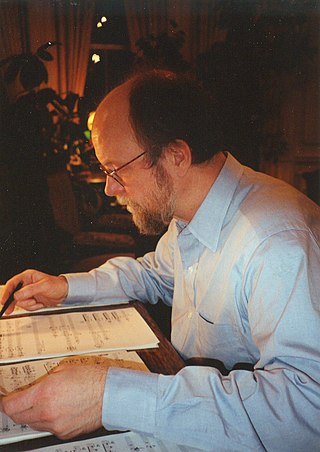
Charles Peter Wuorinen was an American composer of contemporary classical music based in New York City. He also performed as a pianist and conductor. Wuorinen composed more than 270 works: orchestral music, chamber music, solo instrumental and vocal works, and operas, such as Brokeback Mountain. His work was termed serialist but he came to disparage that idea as meaningless. Time's Encomium, his only purely electronic piece, received the Pulitzer Prize. Wuorinen taught at several institutions, including Columbia University, Rutgers University and the Manhattan School of Music.

Julia Wolfe is an American composer and professor of music at New York University. According to The Wall Street Journal, Wolfe's music has "long inhabited a terrain of its own, a place where classical forms are recharged by the repetitive patterns of minimalism and the driving energy of rock". Her work Anthracite Fields, an oratorio for chorus and instruments, was awarded the 2015 Pulitzer Prize for Music. She has also received the Herb Alpert Award (2015) and was named a MacArthur Fellow (2016).
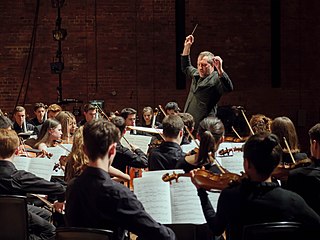
Thomas Joseph Edmund Adès is a British composer, pianist and conductor. Five compositions by Adès received votes in the 2017 Classic Voice poll of the greatest works of art music since 2000: The Tempest (2004), Violin Concerto (2005), Tevot (2007), In Seven Days (2008), and Polaris (2010).
Julian Anderson is a British composer and teacher of composition.
Richard Danielpour is an American composer and academic, currently affiliated with the Curtis Institute of Music and the University of California, Los Angeles.
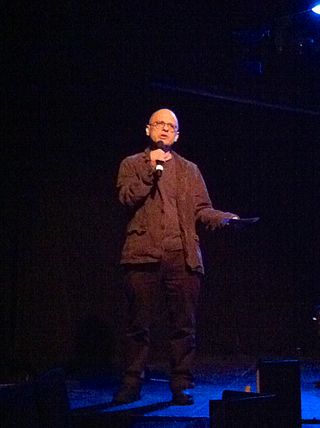
David Lang is an American composer living in New York City. Co-founder of the musical collective Bang on a Can, he was awarded the 2008 Pulitzer Prize for Music for The Little Match Girl Passion, which went on to win a 2010 Grammy Award for Best Small Ensemble Performance by Paul Hillier and Theatre of Voices. Lang was nominated for an Academy Award for "Simple Song #3" from the film Youth.
Bang on a Can is a multi-faceted contemporary classical music organization based in New York City. It was founded in 1987 by three American composers who remain its artistic directors: Julia Wolfe, David Lang, and Michael Gordon. Called "the country's most important vehicle for contemporary music" by the San Francisco Chronicle, the organization focuses on the presentation of new concert music, and has presented hundreds of musical events worldwide.
Bernard Rands is a British-American contemporary classical composer. He studied music and English literature at the University of Wales, Bangor, and composition with Pierre Boulez and Bruno Maderna in Darmstadt, Germany, and with Luigi Dallapiccola and Luciano Berio in Milan, Italy. He held residencies at Princeton University, the University of Illinois, and the University of York before emigrating to the United States in 1975; he became a U.S. citizen in 1983. In 1984, Rands's Canti del Sole, premiered by Paul Sperry, Zubin Mehta, and the New York Philharmonic, won the Pulitzer Prize for Music. He has since taught at the University of California, San Diego, the Juilliard School, Yale University, and Boston University. From 1988 to 2005 he taught at Harvard University, where he is Walter Bigelow Rosen Professor of Music Emeritus.
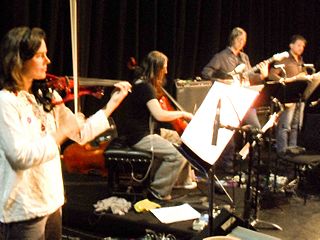
Icebreaker is a UK-based new music ensemble founded by James Poke and John Godfrey. They interpret new music, specialising in a post-minimal and "totalist" repertoire. Icebreaker always play amplified and have a reputation for playing, by classical standards, "seriously loud". They have expanded their repertoire to include non-classical material, particularly in their version of the Brian Eno album Apollo, a project based on the music of Kraftwerk, and music by Scott Walker.
Gordon Crosse was an English composer.

Jimmy López is a classical music composer from Lima, Peru. He has won several international awards and has been nominated to a Latin Grammy Awards. Pieces composed by him have been performed by the Chicago Symphony Orchestra, Philadelphia Orchestra, Boston Symphony Orchestra, Fort Worth Symphony Orchestra, National Symphony Orchestra of Peru, Helsinki Philharmonic Orchestra, MDR Leipzig Radio Symphony Orchestra, Sydney Symphony Orchestra, Houston Symphony, and Orchestre Philharmonique de Radio France. His works have been performed at Carnegie Hall, Sydney Opera House, Gewandhaus Leipzig, and during the 2010 Youth Olympic games in Singapore. His music has been featured in numerous festivals, including Tanglewood Music Festival, Aspen Music Festival, Grant Park Music Festival, Darmstadt International Course for New Music, and Donaueschingen Music Festival.
Mark Grey is an American classical music composer, sound designer and sound engineer.
David Sawer, is a British composer of opera and choral, orchestral and chamber music.
21st-century classical music is art music in the contemporary classical tradition that has been produced since the year 2000. A loose and ongoing period, 21st-century classical music is defined entirely by the calendar and does not refer to a musical style in the sense of Baroque or Romantic music.
Michael Schelle, born January 22, 1950, in Philadelphia, is a composer of contemporary concert music. He is also a performer, conductor, author, and teacher.
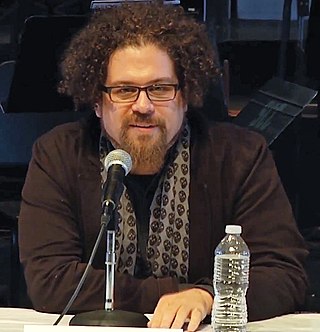
David T. Little is a Grammy-nominated American composer, record producer, and drummer known for his operatic, orchestral, and chamber works, most notably his operas JFK,Soldier Songs, and Dog Days which was named a standout opera of recent decades by The New York Times. He is the artistic director of Newspeak, an eight-piece amplified ensemble that explores the boundaries between rock and classical music, and is the Chair of the composition faculty at Mannes School of Music.
James Woodrow is an English guitarist, active primarily in classical, contemporary classical music and jazz fields, and equally adept on classical and electric guitar.
Vivian Fung is a JUNO Award-winning Canadian-born composer who writes music for orchestras, operas, quartets, and piano. Her compositions have been performed internationally.








